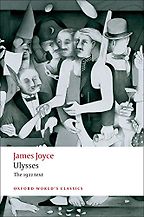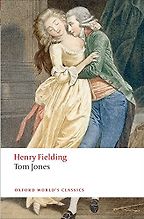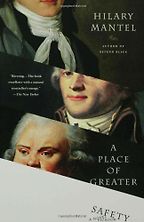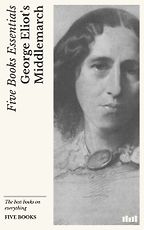For the lucky ones amongst us, there’s still many weeks ahead when all we can do is stay home. It’s a good time to be reading novels, and perhaps finally the moment to read one of those really long ones you always wanted to read, but never quite found the time for. For our long book recommendations, each of us nominated just one novel, though we’ve allowed ourselves passing mentions of one or two others.
1. ULYSSES BY JAMES JOYCE
Asked by a friend who the greatest character in literature was, Joyce replied that, obviously, it was Odysseus—the all-around man. Thus was born Ulysses, the Roman name for Odysseus. Joyce’s man is Leopold Bloom, and in Ulysses, the 24 books of Homer’s Odyssey become 18 discrete episodes. (You’ll finish it having both a favorite book—mine’s Nausicaa—and one [or a few] you found interminable—for me, Proteus or The Oxen of the Sun).
It’s challenging, learned, filthy, and hilarious. In it, Joyce pushes the boundaries of language and the novel form. It’s easy to see how it was thwarted and censored four times during publication. At first, no one wanted to print it, because they could’ve been found liable for publishing pornography (enter Sylvia Beach, owner of the famous Paris bookstore Shakespeare and Company.)
Ulysses is one of those great novels that demands a level of concentration one can only get in isolation. Yes, it’s difficult and frustrating, but that’s because it wants to frustrate you—and the payoff is immense pleasure: no book gets closer to the ineffable experience of human play and tragedy, of being a fleshy mass of blood and bones in the modern world. It pays dividends for the reader who pays it serious attention. Reading Joyce, you feel incredibly close to the mind of a writer whose conviction was that he could do anything with language; no novel I’ve ever read has been more daring or eye-opening. (Though, if you start on Ulysses and find it’s just too hard going, I’d recommend picking up Dubliners or A Portrait of the Artist as a Young Man; they’re better introductions to him.)
As for actually reading it, I recommend Jeri Johnson’s Oxford World’s Classics edition (above) or the more expansive Gabler edition, which includes thousands of corrections to earlier iterations. Ulysses is chock full of allusions, jokes and tricks the modern reader may not understand, so you’ll also want to get your hands on two guides that I kept within reach at all times when I was reading it. The first is Ulysses Annotated by Don Gifford and Robert J Seidman; it’s the most extensive guide by far for breaking down each and every word, phrase, allusion in the book, as well as providing cogent summaries of all the episodes. Reading it cover to cover slowed me down quite a bit while reading Ulysses, but I don’t regret it, for without it I could’ve never gotten the historical context. The Bloomsday Book by Harry Blamires is also useful for summaries; it’s like an intelligent version of Spark Notes (which is no knock against it).
—Stephanie Kelley, Literary Editor
2. WAR AND PEACE BY LEO TOLSTOY
Classics of literature often seem intimidating, especially when they’re long. What’s interesting about them is that often they’re very easy reads, especially once you adjust to the language, which normally takes a few chapters. For me, War and Peace was, literally, a beach read. I read it on holiday the year I turned 19. I spent the days on the beach clutching it in the sand. At night, I stayed awake in the hut where we were staying to find out what happened next by the light of a small lamp, long after everyone else had gone to sleep and trying my best not to disturb anyone.
War and Peace is work of historical fiction that Tolstoy began in 1863—when he was 35 and recently married with a newborn baby—and it looked back to the Napoleonic invasion of Russia half a century before. As editor of Five Books, I’ve spent a lot of energy adding information to our War and Peace page, looking at how it was initially reviewed, what Tolstoy himself said about it, which translation is best and giving my personal take on it. So many experts we’ve interviewed have recommended it and it is an immensely significant book. But, at the end of the day, the reason to read it is that it’s just such pleasurable escapism into a world that’s gone forever. A brutal world, perhaps, when examined by the cold light of day, but still an immensely glamorous and romantic one.
One additional thought on War and Peace and long reads: the book is such an institution, that often when describing another book they love people will say, “This is the War and Peace of…” For example, military historian Antony Beevor called Life and Fate by the Soviet journalist Vasily Grossman “the War and Peace of the 20th century.” It also works across cultures, so The Tale of Genji (which is by a woman, thank goodness) is described as the War and Peace of Japan or The Story of the Stone is the War and Peace of China. If you’re War and Peace obsessed, it’s a nice way of expanding your reading in new directions.
—Sophie Roell, Editor in Chief
3. TOM JONES BY HENRY FIELDING
Tom Jones by Henry Fielding was published in 1749. At nearly 350,000 words, it is quite a brick of a book. In the 271 years since its publication, it has not aged, nor been surpassed. It is the easiest read in the world, the perfect boy-meets-girl story, a romcom-come-social satire set in Hanoverian England, Hogarth set to words. No wonder it has been turned into numerous films and formed the basis of no less than three different operas.
The hero of the book, Tom, is a foundling (bastard) who is brought up by the kindly and judicious Squire Allworthy. Tom is good natured, kind and honourable, but also hot-headed, impetuous and randy. As if that weren’t enough to deal with, other characters, jealous of Allworthy’s affections for Tom, conspire to do him down. Tom has to leave home and gets flung by fate into all kinds of scrapes and, indeed, at one point, prison.
Get the weekly Five Books newsletter
Tom loves Sophia Western, the daughter of Allworthy’s Somerset neighbour, Squire Western. Sophia loves Tom. But it seems impossible that they can be together, given Tom’s illegitimate status. Misunderstanding and mistaken identities abound. It wouldn’t be fair to give any more of the plot away, except to say that the name Sophia means ‘wisdom’, and that this is a tale about a young man who is fundamentally good, but not always wise. Can he put that right? This is one of the very few books I have ever read that is literally unputdownable. I stopped reading occasionally to eat and sleep, but that was all.
—Ben King, History & Economics Editor
4. A PLACE OF GREATER SAFETY BY HILARY MANTEL
One vast novel I can wholly recommend is Hilary Mantel’s A Place of Greater Safety (870pp), her doorstop work of historical fiction about the French Revolution. It’s a remarkable work, deeply steeped in history and the politics of the era, but both immersive and evocative.
It follows Georges Danton, Camille Desmoulins, and Maximilien Robespierre from childhood, through the drama of the revolution and the political morass that follows, until the bloody dissolution of their alliance. Through the interweaving of their intellectual, familial and sexual pursuits, Mantel paints fully realised portraits of these three brilliant, complicated men (and a huge supporting cast).
In the introductory note, Mantel writes: “I have tried to write a novel that gives the reader scope to change opinions, change sympathies: a book that one can think and live inside.” She has succeeded entirely. I still dream about this book.
And – briefly – one more, if you’ll allow me: Donna Tartt’s The Goldfinch, which won her a Pulitzer, is another mammoth contemporary novel I can personally recommend. It’s a sensational, sprawling book, in the Dickensian mould: full of rough diamonds, drama and terrible hardships. It’s well worth your time.
—Cal Flyn, Deputy Editor
Five Books interviews are expensive to produce. If you're enjoying this interview, please support us by donating a small amount.
5. MIDDLEMARCH BY GEORGE ELIOT
Another from me! Middlemarch is staggeringly brilliant, but it’s a labour of love—it’ll take even the most diligent weeks to read. For those new to George Eliot and a little intimidated by this hefty brick, The Mill on the Floss is shorter and lovely, as is Adam Bede, also very readable. But just like there’s nothing wrong with getting to know Henry James by reading The Portrait of a Lady (rather than the shorter Daisy Miller or Washington Square), there’s nothing wrong with starting with this one. Unlike Ulysses, the prose of this one isn’t difficult, per se; on the contrary, George Eliot’s macrocosmic fictional world, perched on the cusp of the Victorian Industrial Revolution, is warm, welcoming, approachable, and enveloping. It’s one thing to enjoy a book, and quite another to to cherish the time spent with a set of characters. I’m envious of anyone getting to know Dorothea Brooke, Tertius Lydgate, Mary Garth and Casaubon for the first time. If I could wipe my memory clean and go back and reread it fresh, I would.
—Stephanie Kelley, Literary Editor
Five Books aims to keep its book recommendations and interviews up to date. If you are the interviewee and would like to update your choice of books (or even just what you say about them) please email us at [email protected]










